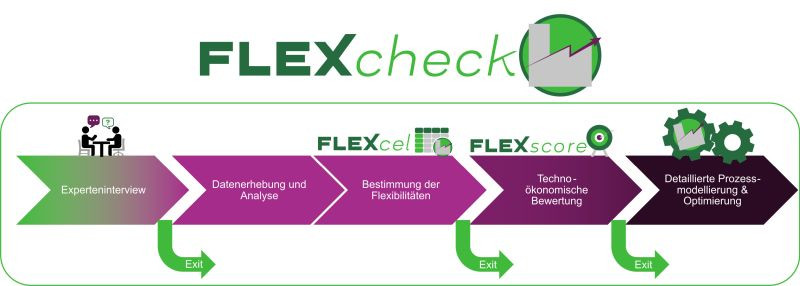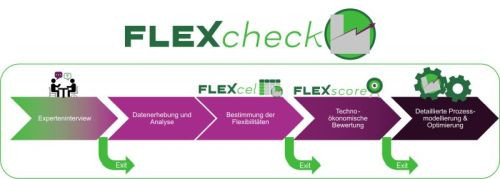FlexCheck: Entwicklung eines Leitfadens zur systematischen Identifizierung & Bewertung von Flexibilitätspotentialen in der Industrie
Eine Herausforderung für elektrische Energieversorgungsnetze ist das Aufrechterhalten des ständigen Gleichgewichts zwischen Strombedarf und Stromerzeugung Der Ausbau von erneuerbaren volatilen Energiequellen verschärft diese Problematik und verursacht durch den steigenden Anteil an erneuerbarem volatilem Strom einen höheren Aufwand und Kosten für Systemdienstleistungen. Eine Maßnahme, um dem entgegenzuwirken, sind flexibel betriebene Verbraucher, die durch Demand Side Management (DSM) auf die Stromerzeugung abgestimmt betrieben werden können, um das elektrische Versorgungsnetz zu entlasten und stabilisieren.

Die Identifizierung solcher Verbraucher, oder Flexibilitätspotentiale, ist im Industriesektor aufgrund der Diversität und Komplexität von industriellen Prozessen jedoch sehr aufwendig und zeitintensiv. Jede Anlagen- und Prozesssituation wird aktuell einzeln betrachtet. Im Hinblick auf diese Herausforderungen ist das übergeordnete Ziel dieses Projektes die Entwicklung eines Leitfadens zur systematischen Identifizierung und Bewertung von Flexibilitätspotentialen in der Industrie. Dabei wird versucht allgemein gültige und strukturierte Analyseschritte zur Identifizierung, technischen Beschreibung und techno-ökonomischen Bewertung von elektrischen, thermischen und stofflichen Flexibilitätspotentialen in der Industrie zu finden.
Der Leitfaden: https://www.best-research.eu/de/publikationen/view/1498
Begleitende Tools:
Fragebogen: Riederer B, Puster M, Pfleger-Schopf K, Gölles M. FLEXcheck - Fragebogen "Identifikation industrieller Flexibilitätspotentiale". Zenodo; 2025. Doi: 10.5281/zenodo.17185135
FLEXcel: Riederer, B., Gölles, M., Pfleger-Schopf, K., Kienberger, T., Schönfelder, J., Dietze, S., Puster, M., & Staudt, S. (2025). FLEXcel (1.0). Zenodo. Doi: 10.5281/zenodo.16759276
FLEXscore: Pfleger-Schopf K, Emami C, Puster M, Riederer B, Kienberger T. (2025) FLEXscore (1.0). Zenodo. To be published.
Mehr Informationen: http://flexcheck.best-research.eu/
>>> Download Endbericht <<<
Projektvolumen
EUR 249.988,00
Projektlaufzeit
2023-07-01 - 2025-09-30
Finanzierung
Land Steiermark, 15. Ausschreibung (2022): GREEN TECH X - Die nächste Generation von Kreislaufwirtschaft & Klimaschutz“
Projektpartner

(Konsortioalführer)
Ansprechperson

Bernd RIEDERER
bernd.riederer@best-research.eu
Area Management

Markus GÖLLES
markus.goelles@best-research.eu
